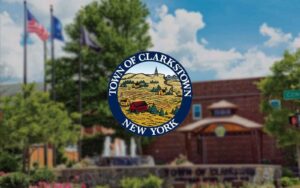Unfortunately, one of the most remarkable people to ever live in Rockland County has been
largely forgotten by most: William Henry Myers. A civil rights pioneer in his own right, Myers
was a former slave, a warrior who served and was wounded in the Civil War fighting for the
Union, and the first and only African American to be nominated and to run for elective office in
Rockland County during the 19 th Century. Let’s take a look at this remarkable man who as
historian Carl Nordstrom once wrote, “in the tradition of Frederick Douglass, made himself
from slave to man.”
William Henry Myers was born into slavery on a cotton plantation in Virginia on August 17,
1848. Not much is known of his early life working on the plantation as a slave. In 1860, he was
sold by his master to a plantation in Louisiana where he labored for three years. On June 2,
1863, at the age of fifteen, Myers somehow managed to escape. In search of refuge, Myers
sought out General Daniel Ullman (another Rocklander) who was drilling colored Union troops
in the nearby area. Myers made his way to their encampment and enlisted, becoming a private
and a drummer. He would serve for three years, ultimately at the rank of 1st Sergeant of
Company K of the 5 th Regiment of the U.S. Colored Troops. During his service, Myers was
wounded and captured by the Texas Rangers. Once again, Myers was able to escape from his
captors and returned to his regiment where he continued to fight through the end of the war.
After the Civil War ended, Myers was discharged at the age of seventeen and was appointed as
Justice of the Peace for Tallula, Mississippi. Myers was later elected to the position and wrote
that he “hoped to reconcile antagonisms so that harmony, order, peace and goodwill might be
the result.” Unfortunately, the initial post-war civil rights progress in the South ended quickly,
as the rise of the Klu Klux Klan forced Myers and many other freed slaves to flee to the North.
Sometime after 1870, for reasons unknown, Myers and his uncle came to Rockland County and
settled in Nyack. It is speculated that he may have been drawn to Rockland because Frederick
Douglass had come here in 1872 to speak in Nyack and was well received. Regardless of the
reason for relocating here, Myers quickly established himself.
The 1875 United States Census lists Myers as being a house servant to a white family in Nyack,
a town experiencing exponential growth in the 1870s and 1880s. Myers became a stalwart
member of the St. Phillip AME Zion Church in Nyack, eventually leading the efforts to build a
new church. As an elder and leader in the congregation, Myers was recognized in 1909 at a
celebration commemorating the 49 th anniversary of the church. Myers was quoted in a local newspaper article explaining why he and so many other freed slaves fled to the North and places like Nyack. Myers stated, “Having been the victim of Southern outrage myself, having been driven from the polls with a seven shooter held too close to my head for comfort, for no other offense than giving tickets (ballots) to poor, ignorant negroes and explaining to them, I am anxious to testify as to what made me and thousands more lose all interest in politics while in the South.”
Fortunately, Myers did not lose interest in politics altogether. Upon his arrival in Nyack, he
became an active member and participant in the local Republican party. According to local
historian Carl Nordstrom, politics in 19 th century Rockland was dominated by Democrats, who
were part of the establishment of the county and not in sync with the newly arrived freed
slaves. The Democrats catered to the wealthy and more established residents, while the
Republican Party was less established but more welcoming to the African American community.
In fact, the Republican party at the time took to forming political clubs for African Americans as
a gateway into voting and organized political activity. In 1880, with the assistance of members
of the Republican party, the Nyack Black Grand Army of the Republic Silliman Post # 172 was
founded. William Henry Myers was elected as the first commander. In addition, he joined one
of the newly formed Republican clubs and became a well-respected leader. With his reputation
firmly established, William Henry Myers had put himself in a position to make history in
Rockland County.
In 1888, Myers was nominated for the office of Constable of Orangetown. He ran for the
position on the Republican line as the first African American to run for elected office in
Rockland County. Unfortunately, his campaign fell short, and Myers came in third place in the
voting. He garnered 379 votes, falling behind two other candidates who received, 427 and 567
votes respectively. The very fact that Myers had run for office was a sign that much had
changed, but it also indicated that we still had a long way to go. One local newspaper, “City and
Country,” in its March 17 th edition, attributed the Republican party’s poor showing in that
election to having Myers on the ballot. Regrettably, Myers was the only African American in the
19 th Century to run for elective office in Rockland County, and it would be well into the 20 th
Century before an African American would be officially elected.
Myers remained involved with various political and community groups but never again ran for
office. He died on December 17, 1917, at the age of 69, and was buried in Mount Moor in West
Nyack. The life of this remarkable man is simply incredible. William Henry Myers deserves far
more recognition given all that he overcame and the many leadership roles he achieved. Born a
slave, Myers escaped to become a soldier fighting to free others and was promoted to the First
Sergeant in his Company. He was appointed and elected as Justice of the Peace in the South
and rose to become a leader in his church and the larger community in Rockland County. But
sometime after his death, Myers’s legacy became largely forgotten.
Thankfully, in 2021 the Town began to highlight the life of this remarkable pioneer by working
with the Friends of Mount Moor and the Veterans Administration. Together, these organizations set out to replace the headstone on Myers’s grave, which had been lost. The exact location of his grave in Mount Moor remains unknown today, but a new headstone is in place to honor his life. Today the headstone is located in a line along with several other members of the Colored Volunteers of America who fought for the Union.
If you’re looking for a meaningful way to honor Black History Month, you may want to visit Mt. Moor and pay your respects to William Henry Myers; a remarkable man with a life well-lived.


